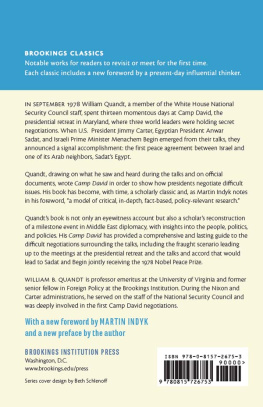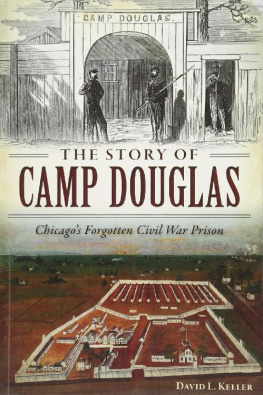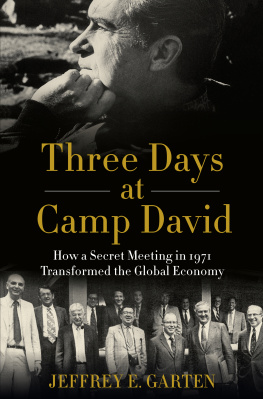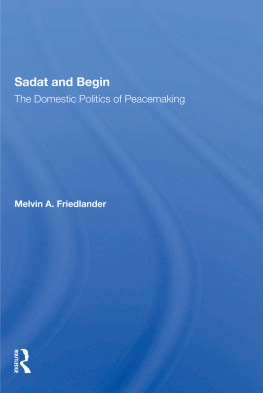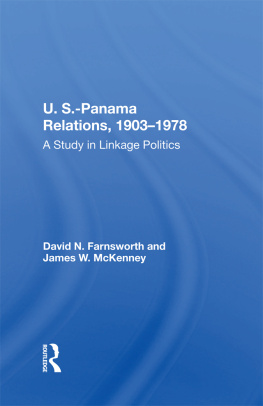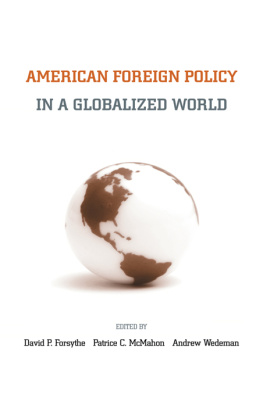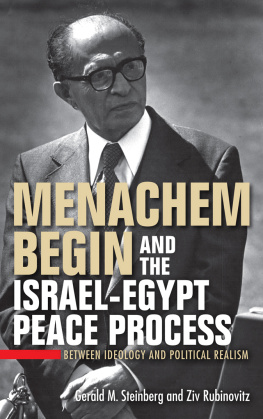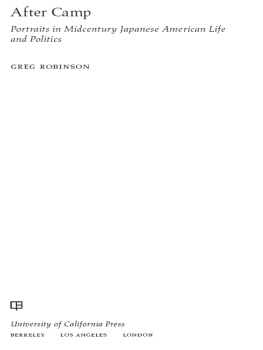Quandt William B. - Camp David: peacemaking and politics
Here you can read online Quandt William B. - Camp David: peacemaking and politics full text of the book (entire story) in english for free. Download pdf and epub, get meaning, cover and reviews about this ebook. City: Middle East;United States, year: 2016, publisher: Brookings Institution Press, genre: Politics. Description of the work, (preface) as well as reviews are available. Best literature library LitArk.com created for fans of good reading and offers a wide selection of genres:
Romance novel
Science fiction
Adventure
Detective
Science
History
Home and family
Prose
Art
Politics
Computer
Non-fiction
Religion
Business
Children
Humor
Choose a favorite category and find really read worthwhile books. Enjoy immersion in the world of imagination, feel the emotions of the characters or learn something new for yourself, make an fascinating discovery.
- Book:Camp David: peacemaking and politics
- Author:
- Publisher:Brookings Institution Press
- Genre:
- Year:2016
- City:Middle East;United States
- Rating:5 / 5
- Favourites:Add to favourites
- Your mark:
- 100
- 1
- 2
- 3
- 4
- 5
Camp David: peacemaking and politics: summary, description and annotation
We offer to read an annotation, description, summary or preface (depends on what the author of the book "Camp David: peacemaking and politics" wrote himself). If you haven't found the necessary information about the book — write in the comments, we will try to find it.
Camp David: peacemaking and politics — read online for free the complete book (whole text) full work
Below is the text of the book, divided by pages. System saving the place of the last page read, allows you to conveniently read the book "Camp David: peacemaking and politics" online for free, without having to search again every time where you left off. Put a bookmark, and you can go to the page where you finished reading at any time.
Font size:
Interval:
Bookmark:
U.N. RESOLUTION 242, NOVEMBER 22, 1967
The Security Council,
Expressing its continuing concern with the grave situation in the Middle East,
Emphasizing the inadmissibility of the acquisition of territory by war and the need to work for a just and lasting peace in which every State in the area can live in security,
Emphasizing further that all Member States in their acceptance of the Charter of the United Nations have undertaken a commitment to act in accordance with Article 2 of the Charter.
- Affirms that the fulfillment of Charter principles requires the establishment of a just and lasting peace in the Middle East which should include the application of both the following principles:
(i) Withdrawal of Israeli armed forces from territories occupied in the recent conflict;
(ii) Termination of all claims or states of belligerency and respect for and acknowledgement of the sovereignty, territorial integrity and political independence of every State in the area and their right to live in peace within secure and recognized boundaries free from threats or acts of force;
- Affirms further the necessity:
(a) For guaranteeing freedom of navigation through international waterways in the area;
(b) For achieving a just settlement of the refugee problem;
(c) For guaranteeing the territorial inviolability and political independence of every State in the area, through measures including the establishment of demilitarized zones;
- Requests the Secretary-General to designate a Special Representative to proceed to the Middle East to establish and maintain contacts with the States concerned in order to promote agreement and assist efforts to achieve a peaceful and accepted settlement in accordance with the provisions and principles of this resolution;
- Requests the Secretary-General to report to the Security Council on the progress of the efforts of the Special Representative as soon as possible.
U.N. RESOLUTION 338, OCTOBER 22, 1973
The Security Council
- Calls upon all parties to the present fighting to cease all firing and terminate all military activity immediately, no later than 12 hours after the moment of the adoption of this decision, in the positions they now occupy;
- Calls upon the parties concerned to start immediately after the ceasefire the implementation of Security Council Resolution 242 (1967) in all of its parts;
- Decides that, immediately and concurrently with the cease-fire, negotiations shall start between the parties concerned under appropriate auspices aimed at establishing a just and durable peace in the Middle East.
Having exchanged views regarding the unsafe situation which remains in the Middle East, U.S. Secretary of State Cyrus Vance and Member of the Politbureau of the Central Committee of the CPSU, Minister for Foreign Affairs of the U.S.S.R. A.A. Gromyko have the following statement to make on behalf of their countries, which are cochairmen of the Geneva Peace Conference on the Middle East:
1. Both governments are convinced that vital interests of the peoples of this area, as well as the interests of strengthening peace and international security in general, urgently dictate the necessity of achieving, as soon as possible, a just and lasting settlement of the Arab-Israeli conflict. This settlement should be comprehensive, incorporating all parties concerned and all questions.
The United States and the Soviet Union believe that, within the framework of a comprehensive settlement of the Middle East problem, all specific questions of the settlement should be resolved, including such key issues as withdrawal of Israeli Armed Forces from territories occupied in the 1967 conflict; the resolution of the Palestinian question, including insuring the legitimate rights of the Palestinian people; termination of the state of war and establishment of normal peaceful relations on the basis of mutual recognition of the principles of sovereignty, territorial integrity, and political independence.
The two governments believe that, in addition to such measures for insuring the security of the borders between Israel and the neighboring Arab states as the establishment of demilitarized zones and the agreed stationing in them of U.N. troops or observers, international guarantees of such borders as well as of the observance of the terms of the settlement can also be established should the contracting parties so desire. The United States and the Soviet Union are ready to participate in these guarantees, subject to their constitutional processes.
2. The United States and the Soviet Union believe that the only right and effective way for achieving a fundamental solution to all aspects of the Middle East problem in its entirety is negotiations within the framework of the Geneva peace conference, specially convened for these purposes, with participation in its work of the representatives of all the parties involved in the conflict including those of the Palestinian people, and legal and contractual formalization of the decisions reached at the conference.
In their capacity as cochairmen of the Geneva conference, the United States and the U.S.S.R. affirm their intention, through joint efforts and in their contacts with the parties concerned, to facilitate in every way the resumption of the work of the conference not later than December 1977. The cochairmen note that there still exist several questions of a procedural and organizational nature which remain to be agreed upon by the participants to the conference.
3. Guided by the goal of achieving a just political settlement in the Middle East and of eliminating the explosive situation in this area of the world, the United States and the U.S.S.R. appeal to all the parties in the conflict to understand the necessity for careful consideration of each other's legitimate rights and interests and to demonstrate mutual readiness to act accordingly.
The text comes from U.S., U.S.S.R. Issue Statement on the Middle East, Department of State Bulletin, vol. 77 (November 7, 1977), pp. 63940. The statement was issued in New York City.
In the name of God, Mr. Speaker of the Knesset, ladies and gentlemen, allow me first to thank deeply the Speaker of the Knesset for affording me this opportunity to address you.
I come to you today on solid ground to shape a new life and to establish peace. We all love this land, the land of God, we all, Moslems, Christians and Jews, all worship God.
I do not blame all those who received my decision when I announced it to the entire world before the Egyptian People's Assembly. I do not blame all those who received my decision with surprise and even with amazement, some gripped even by violent surprise. Still others interpreted it as political, to camouflage my intentions of launching a new war.
I would go so far as to tell you that one of my aides at the presidential office contacted me at a late hour following my return home from the People's Assembly and sounded worried as he asked me: Mr. President, what would be our reaction if Israel actually extended an invitation to you?
I replied calmly: I would accept it immediately. I have declared that I would go to the end of the earth. I would go to Israel, for I want to put before the people of Israel all the facts. No one could have ever conceived that the president of the biggest Arab state, which bears the heaviest burden and the main responsibility pertaining to the cause of war and peace in the Middle East, should declare his readiness to go to the land of the adversary while we were still in a state of war.
Font size:
Interval:
Bookmark:
Similar books «Camp David: peacemaking and politics»
Look at similar books to Camp David: peacemaking and politics. We have selected literature similar in name and meaning in the hope of providing readers with more options to find new, interesting, not yet read works.
Discussion, reviews of the book Camp David: peacemaking and politics and just readers' own opinions. Leave your comments, write what you think about the work, its meaning or the main characters. Specify what exactly you liked and what you didn't like, and why you think so.

